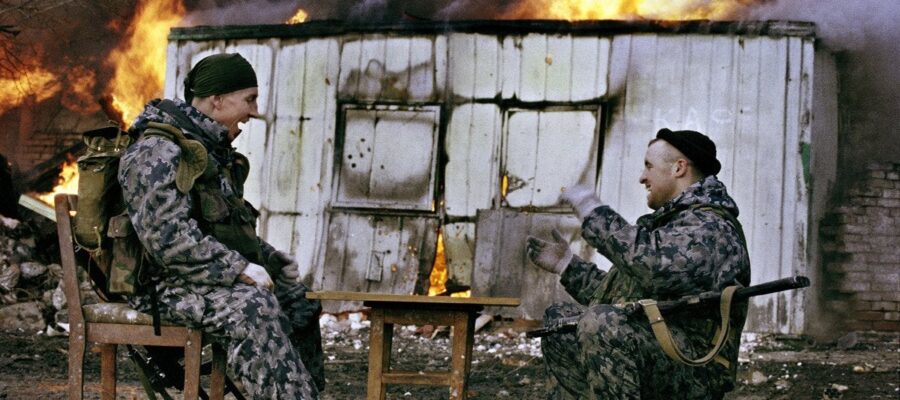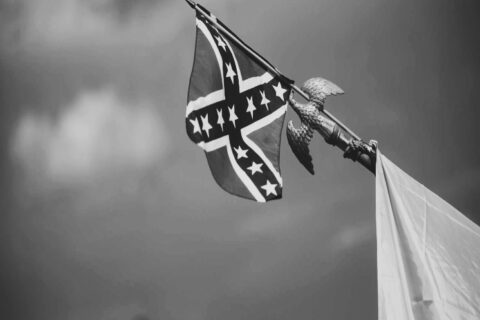“War was always here. Before man was, war waited for him. The ultimate trade awaiting its ultimate practitioner.”
Cormac McCarthy, Blood Meridian
“Mother I’m a soldier, Jehovah with a gun. Mother, you’d die if I told you what I’ve done.”
Lee Harvey Oswald Band, “Panic in Hanoi”
To the giddy delight of many, we may be on the eve of what could be yet another multinational war.
The leading event of course being the encouraged fight between the outrageously corrupt governments of Russia and the 2014 CIA-installed Ukrainian government, an installation that nullified their democratic election, eclipsing in audacity America’s 2020 theft.
These two countries were one country for more than 500 years, until 1991. A fight between little Russia and big Russia makes no sense but then the pretense for starting wars is almost always a fig leaf.
Setting aside the machinations of those nudging the Russian/Ukrainian fight along and what the scope of a conflict might be, it’s worth pausing to think about war, and especially big wars, as a phenomenon, more akin to a natural occurrence on the order of hurricanes and volcanoes.
I want to be clear; I’m not making a Freakonomic style argument dispassionately saying war is good and desirous. War, like a great fire burning through a forest, has consequences that have historically brought growth, innovation, and change that advances many parts of civilization. Whether they are good and the cost is worth it is another question.
The cost for these advances? High, indeed, the elimination of entire cultures, lost knowledge, destroyed art and wonders, wealth transfers, and, of course, mountains of dead. The possibility of nuclear annihilation is a contemporary specter and not a trivial concern.
And yet, we love it. We crave the very idea of war.
Hey This Is Cool, So This Is War, I’ll Get A Scope And Improve My Score
One of the running themes in Walker Percy’s fiction and non-fiction (see Lost in the Cosmos) is the existential question of, how does one face yet another Wednesday afternoon?
Percy explores the many ways we attempt to muddle through. For some, sex is the path for reconnecting with self and others. For others, it’s a vague spirituality and ideology. Yet, it is crisis that Percy persuasively makes the strongest case for, as the means by which we most deeply connect with our sense of purpose and vitality.
Modernity has made life too easy, too predictable, too safe. In witnessing a train wreck and rushing to the aid of others, amidst the carnage and danger, our immediate purpose and course of action is finally, blissfully clear. The warrior knows this as well. But in polite society, neither the civilian hero nor the soldier can admit to others they’ve never felt more alive in crisis. As Percy quipped, our greatest fear is not what to do if the bomb drops, but what do we do if it doesn’t?
It is not an urban myth that combat soldiers have a tough time readjusting to civilian life. A neighbor a few years younger than myself had four tours in our middle east adventures. The last two he requested. When he finally came home, his father-in-law had a very nice executive position for him at the family company, one of the country’s largest cardboard box manufacturers. It was many rocky years before he could cope with Wednesday afternoons at the box factory.
Though fictionalized throughout Michael and Jeff Shaara’s Civil War trilogy (The Killer Angels, Gods and Generals, and The Last Full Measure) they drew from detailed accounts and diaries to express not just an enthusiasm for fighting, but a love of battle. The gnawing restlessness of home leave and the eagerness to be back at war was fantastically strong. Lee, in particular, struggled with this.
We see this throughout the ancient world, too. Next to religious and cosmological texts, the battlefield is presented as most sacred. On it, you achieved both temporal and immortal glory.
For individuals then, we can understand the allure of war. It offers a clear purpose. And for moderns, the chance to escape the mundane terrible life of being cared for, to not be bored, to achieve glory and to form bonds with other men in the ultimate adventure that transcends what is even possible with a spouse.
So, what’s in it for the State?
War Is The Health Of The State
The cranky right-leaning sociologist, author, and professor Robert Nisbet focused his life’s work on the causes and consequences of the destruction of community by mass democracy and the false god of individualism.
His thesis in The Present Age: Progress and Anarchy in Modern America is that there is a very high correlation between wars in Western history and periods of invention and discovery. If necessity is the mother of invention, then military necessity is the “Great Mother.”
His survey in The Present Age is focused largely on the World Wars and Vietnam. Were a new edition published that took into account America and the world post 9/11, it would merely mean including more examples in the same categories and effectively prove his thesis.
In spite of the hyped threat our “enemies” present, those cheering most loudly for war have material and social agendas to accomplish. They are at peace with war because, for them, it is a noble lie, an opportunity to adjust the levers of civilization for the better.
The telephone, electric lights, radio, automobile, airplanes (and much more) were brought to a higher degree of perfection during World War I. The federal government, justified and encouraged by war pressure, was able to do what would have been impossible during peacetime. They not only encouraged entrepreneurial ventures but directly financed efforts.
Medicine and the necessity for new and radical advancements in surgical techniques proceeded at a pace that likewise would have been impossible without war fueling the need. By the close of World War II, entire new fields were created, prosthetics being just one.
Nisbet cites how revolution and social reforms are also common accompaniments of modern national wars. Lenin knew this. The 1917 Revolution would not have been possible without the backdrop of war.
In America, World War I accelerated social and economic reforms that may not have taken place at all, and certainly not within the compressed timeframe. If specific war reforms didn’t last, war set a pattern that permanently impressed on the civic and political mind that reform was possible. Some of the more notable included: the enfranchisement of women immediately after war’s end, Prohibition, and literacy campaigns with a more muscular top-down educational system after the results of mass literacy tests for recruits revealed concerning results.
Unions and workers organized, and socialist goals long struggled for but never achieved prior to the Great War, effortlessly rolled out beyond what was even conceivable by radicals.
Another by-product beginning with the French Revolution was the sense of a broad and pervasive national community. The tendency for divisiveness gives way to moderate positions and a spirit of unity takes over. Dissidents are not welcome. Local bonds and civic roles are shattered, replaced by the national versions and pressure for total allegiance to the nation rather than the hamlet.
War induces, and especially in the military and the adjacent supporters, a sense of camaraderie that become permanent sub-communities. The moral and social bonding that takes place from being together on the front lines, in the trench, and on the long campaign are ancient with allegiances that ripple through all society “back home.”
Nisbet notes how war is also the tried-and-true mechanism recasting the moral values when a people are perceived to have become stale and flat. All wars of significance and duration have a secularizing effect. The Puritan ethos of America, even during World War I, was radically and irreversibly destroyed.
War weakens the authority of religious and traditional moral values. This is true because for wars to be successfully fought, many of the taboos about life, property, sexuality, family and faith, must be subordinated “if we are to have victory and survive.” The ideas of chastity, decorum and respectability quickly change during war and the needle never settles to its original position. The 20th century saw millions of men dropped into other cultures and, for a great many, the shocking exposure to exotic or cosmopolitan life, even in shambles, made the rural homestead intolerably parochial.
Considering just the impact of the World Wars, culturally, the arts and music rapidly changed as a general openness and experimentation was encouraged. Hollywood became a world-wide phenomenon and a channel of political and cultural propaganda that created a feedback loop we’re still stuck in.
Wars bring a flood of prosperity for the militarized state that, in turn, substantially funds science, technology and other sectors of the economy. Our foreign policy would not be conceivable without the wars of the 20th century.
The litany continues. War literally is the health of the state.
Death and Taxes…and War
Well before Augustine’s Just War Theory, ancient Egypt, India, Confucius, and both the Greeks and Romans all had extensive treatments on the rules and limits of war. This is telling because all, even the early Church, acknowledged the permanence and the naturalness of war. There were no tomes pretending that lasting peace was possible…or even desirable.
The ghouls that begin wars are aware of all the benefits it will bring the state. But they are not alone in being guilty of hypocrisy and deceit.
Between us and them, there is the part neither party says out loud because, as Percy observed and what Cormac McCarthy implies in the opening quote, stirring in our hearts is a lust for the ultimate thrill, the chance to walk a path, even vicariously, that alone is capable of giving us the incomparable release and primal dark satisfaction that war delivers.

‘Cause down in Alabama, you can run, but you sure can’t hide.






Appropriate video I made many years ago (the names might change, but the Empire doesn’t):
https://youtu.be/3XRkVXpFNks
We ARE addicted to war:
https://youtu.be/-LQQ_Sbr4L4
We are in perpetual war:
https://youtu.be/stHTqAYRRhk
“Unions and workers organized….”
During WW1 the communist organizers stopped munition manufacturing in England, until the English government recognized their labor union, witnessed in the book, “revolt on the Clyde”, William Gallacher, M.P. 1936. Elected to parliament the book ends with a speech in that government body gushing on about “the workers paradise in Russia” and the need of England to protect it. This subversive activity was also going on in WW1 Germany, and was the catalyst, amongst other things (newspaper, radio etc.) to the Germans feeling they were stabbed in the back during WW1 (and the resentment felt by the war veterans and people, and the very animus to get their country back seen in the book about war propaganda, “First Casualty.” Phillip Knightly) subsequently, after taking back control of Germany, the Germans created Racial laws to protect them from any Alien influence in their National body from ever doing that to them again.
Heaven Help Us